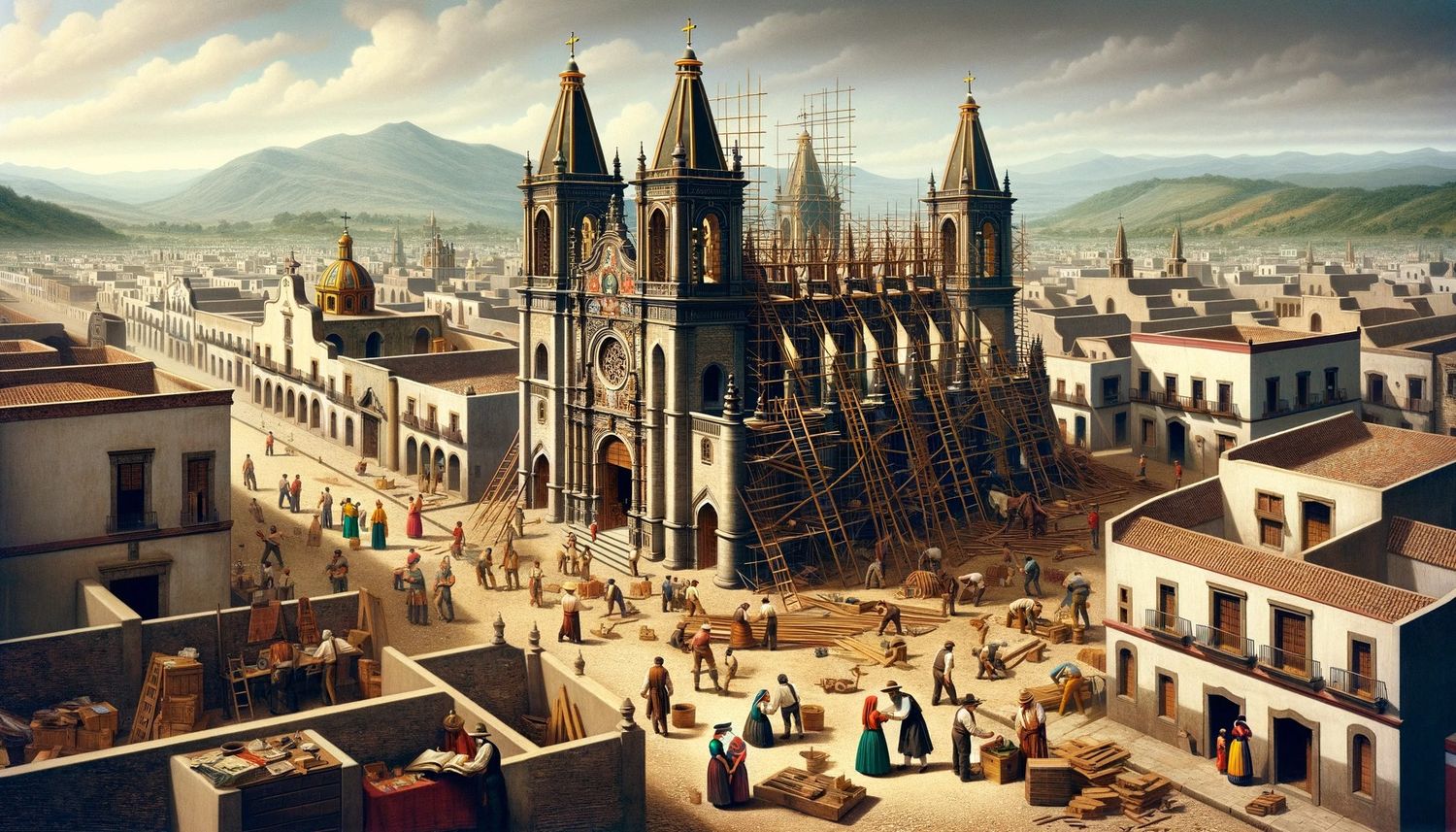Home>Theology and Spirituality>How Are Catholicism And Islam Similar


Theology and Spirituality
How Are Catholicism And Islam Similar
Published: February 15, 2024
Ericka Andersen, an editor at Christian.net, expertly merges digital strategy with content creation, focusing on faith and societal issues. Her communication skills enhance the platform's engaging narratives, fostering meaningful dialogue on belief's impact on society.
Discover the similarities between Catholicism and Islam in theology and spirituality. Explore the common ground and shared beliefs of these two faiths.
(Many of the links in this article redirect to a specific reviewed product. Your purchase of these products through affiliate links helps to generate commission for Christian.net, at no extra cost. Learn more)
Table of Contents
Introduction
Catholicism and Islam are two of the world's major religions, each with a rich history and a profound impact on the lives of their followers. While these faiths may seem distinct at first glance, a closer examination reveals striking similarities in their core beliefs and practices. Exploring these parallels can foster a deeper understanding of the shared values that underpin these influential religious traditions.
Both Catholicism and Islam have deep roots in monotheism, emphasizing the worship of a single, all-powerful deity. This fundamental belief in the oneness of God serves as a unifying force, shaping the spiritual outlook and guiding the moral compass of millions of adherents worldwide. Furthermore, the significance of prayer, charity, and religious leadership holds a central place in the fabric of both faiths, offering a common ground for spiritual reflection and communal engagement.
By delving into the common threads that weave through Catholicism and Islam, we can gain a broader perspective on the universal themes of devotion, compassion, and reverence that resonate across diverse cultures and traditions. This exploration seeks to illuminate the interconnectedness of human spirituality, transcending the boundaries of individual faiths to reveal the shared aspirations and virtues that bind humanity together.
Belief in One God
Both Catholicism and Islam are rooted in the belief in one God, known as monotheism. This foundational principle serves as the cornerstone of their respective faiths, shaping the worldview and guiding the spiritual practices of their followers.
In Catholicism, the belief in one God is encapsulated in the doctrine of the Holy Trinity, which professes the existence of one God in three divine persons: the Father, the Son (Jesus Christ), and the Holy Spirit. This triune nature of God is central to Catholic theology, emphasizing the unity and omnipotence of the divine being. The Catechism of the Catholic Church underscores the oneness of God, stating, "The Trinity is a mystery of faith in the strict sense, one of the 'mysteries that are hidden in God, which can never be known unless they are revealed by God'" (CCC 237).
Similarly, Islam upholds the unequivocal belief in the oneness of God, as articulated in the Shahada, the Islamic declaration of faith: "There is no god but Allah, and Muhammad is his messenger." This declaration, known as the Tawhid, affirms the absolute unity and uniqueness of Allah, the Arabic word for God. The concept of Tawhid is central to Islamic theology, emphasizing the indivisible oneness of God and rejecting any form of association or partnership with Him.
Despite the doctrinal differences in understanding the nature of God, both Catholicism and Islam share a profound commitment to monotheism, anchoring their spiritual identity in the worship of a singular, transcendent deity. This shared belief in the oneness of God serves as a unifying force, fostering a deep sense of reverence, devotion, and moral responsibility among their adherents.
The belief in one God not only forms the theological bedrock of Catholicism and Islam but also serves as a unifying principle that transcends cultural and geographical boundaries, uniting believers in their devotion to the divine. This shared monotheistic foundation underscores the profound interconnectedness of these two global faith traditions, illuminating the enduring significance of monotheism in shaping the spiritual consciousness of humanity.
In essence, the belief in one God stands as a testament to the profound spiritual unity that binds Catholicism and Islam, offering a compelling reflection of the universal human yearning for transcendence and divine guidance.
Importance of Prayer
Prayer holds a central and revered position in both Catholicism and Islam, serving as a vital means of spiritual communion, reflection, and supplication. The act of prayer is deeply ingrained in the daily lives of adherents, offering a profound avenue for connecting with the divine and seeking solace, guidance, and inner peace.
In Catholicism, prayer is regarded as a pivotal expression of faith and devotion, encompassing a rich tapestry of traditional prayers, liturgical rites, and personal devotions. The Catholic Church emphasizes the significance of various forms of prayer, including the Lord's Prayer (Our Father), the Hail Mary, the Rosary, and the Liturgy of the Hours. These prayers serve as a means of praising God, seeking intercession from saints, and meditating on the life of Jesus Christ and the mysteries of the faith.
Similarly, in Islam, prayer, known as Salah, holds a paramount role in the daily spiritual practice of Muslims. The Islamic tradition prescribes five obligatory prayers each day, fostering a rhythm of spiritual mindfulness and connection with Allah. These prayers, performed at specific times throughout the day, serve as a constant reminder of the divine presence and the submission to God's will. The act of Salah involves physical postures, recitations from the Quran, and supplications, creating a profound sense of spiritual discipline and devotion.
Despite the differences in the specific prayers and rituals, both Catholicism and Islam underscore the transformative power of prayer in nurturing a deep and intimate relationship with the divine. Prayer serves as a conduit for expressing gratitude, seeking guidance, and finding solace in times of joy or adversity. Moreover, the communal aspect of prayer fosters a sense of unity and solidarity among believers, reinforcing the shared values of humility, reverence, and spiritual interconnectedness.
The importance of prayer in Catholicism and Islam transcends doctrinal disparities, embodying a universal yearning for spiritual connection and transcendence. Through the act of prayer, adherents of both faiths cultivate a profound sense of inner peace, resilience, and spiritual vitality, enriching their lives with a deep sense of purpose and divine communion.
In essence, the shared emphasis on prayer in Catholicism and Islam underscores the enduring significance of this spiritual practice in nurturing the human soul and fostering a profound sense of spiritual interconnectedness with the divine.
Emphasis on Charity and Good Deeds
Both Catholicism and Islam place a strong emphasis on charity and good deeds as integral expressions of faith and compassion. The commitment to altruism and benevolence serves as a cornerstone of their respective religious teachings, inspiring believers to actively engage in acts of kindness, generosity, and social responsibility.
In Catholicism, the principle of charity is deeply rooted in the teachings of Jesus Christ, who exemplified selfless love and compassion through his ministry. The Catholic Church emphasizes the moral imperative of charity, encapsulated in the theological virtues of faith, hope, and charity (love). The Catechism of the Catholic Church underscores the significance of charity, stating, "Charity is the theological virtue by which we love God above all things for his own sake, and our neighbor as ourselves for the love of God" (CCC 1822). This profound call to love and serve others, especially the marginalized and vulnerable, forms the ethical foundation of Catholic social teaching, guiding believers to alleviate suffering, promote justice, and uphold the dignity of every human person.
Similarly, in Islam, the concept of charity, known as Zakat, holds a central place in the ethical framework of the faith. Zakat is one of the Five Pillars of Islam, mandating the giving of a portion of one's wealth to support the less fortunate and address societal inequities. The Quran underscores the importance of charity, stating, "You will not attain righteousness until you spend from that which you love. And whatever you spend – indeed, Allah is Knowing of it" (Quran 3:92). This directive emphasizes the transformative power of charity in purifying one's wealth and fostering social cohesion, compassion, and economic equity within the Muslim community.
The shared emphasis on charity and good deeds in Catholicism and Islam reflects a profound commitment to social justice, empathy, and solidarity with the marginalized. Both faith traditions recognize the inherent dignity of every individual and advocate for the alleviation of poverty, the provision of basic needs, and the promotion of human flourishing. The acts of charity and kindness, whether through almsgiving, volunteering, or advocating for systemic change, embody the universal imperative of compassion and altruism that transcends religious boundaries.
In essence, the shared emphasis on charity and good deeds in Catholicism and Islam underscores the enduring significance of these virtues in fostering a more compassionate, just, and interconnected world. The commitment to selfless giving and compassionate action serves as a testament to the transformative power of love and empathy in shaping the human experience and advancing the common good.
Role of Religious Leaders
In both Catholicism and Islam, religious leaders play pivotal roles in guiding, nurturing, and shepherding their respective communities, embodying the spiritual authority and moral guidance essential to the practice of faith.
In Catholicism, the clergy, including bishops, priests, and deacons, assume diverse pastoral responsibilities within the Church. Bishops, as successors to the apostles, oversee dioceses and provide spiritual leadership, doctrinal guidance, and sacramental oversight. Priests, ordained to serve as spiritual shepherds, administer the sacraments, offer pastoral care, and proclaim the Gospel, serving as conduits of God's grace and compassion. Deacons, ordained for service, engage in charitable works, pastoral ministry, and community outreach, embodying the call to servant leadership within the Church.
Similarly, in Islam, religious leadership encompasses the roles of Imams, scholars, and community leaders who uphold the teachings of the faith and provide spiritual guidance. Imams, often leading congregational prayers and delivering sermons, serve as spiritual leaders within mosques, offering pastoral care, religious instruction, and moral counsel to the Muslim community. Scholars, renowned for their expertise in Islamic jurisprudence and theology, provide authoritative interpretations of religious texts, ethical guidance, and scholarly insights, enriching the spiritual understanding of believers. Community leaders, through their knowledge and wisdom, foster unity, resolve disputes, and promote the ethical principles of Islam within diverse societal contexts.
The role of religious leaders in both Catholicism and Islam extends beyond ritual and doctrinal matters, encompassing pastoral care, moral guidance, and community stewardship. These leaders serve as beacons of faith, compassion, and wisdom, nurturing the spiritual growth and ethical conduct of their congregations. Their influence transcends the confines of religious institutions, shaping the moral fabric of society and advocating for justice, peace, and solidarity.
In essence, the role of religious leaders in Catholicism and Islam embodies the sacred trust of shepherding souls, fostering spiritual flourishing, and upholding the ethical principles of their respective faiths. Their dedication, wisdom, and pastoral care exemplify the enduring significance of spiritual leadership in nurturing vibrant, compassionate, and morally grounded communities of faith.
Read more: What Religion Is Similar To Baptist
Pilgrimage to Holy Sites
Pilgrimage holds a profound significance in both Catholicism and Islam, serving as a sacred journey of spiritual devotion, reflection, and renewal. The act of embarking on a pilgrimage to holy sites holds a revered place in the religious practices of these faith traditions, offering believers an opportunity to deepen their connection with the divine and draw inspiration from the hallowed history and spirituality enshrined in these sacred locations.
In Catholicism, pilgrimage sites hold a special place of reverence, drawing millions of pilgrims seeking spiritual enrichment and encounters with the divine. Among the most renowned pilgrimage destinations is the Vatican City, home to St. Peter's Basilica and the Papal enclave, where faithful Catholics converge to pay homage to the apostle Peter and the spiritual leadership of the Church. Additionally, sites such as Lourdes in France, Fatima in Portugal, and Santiago de Compostela in Spain beckon pilgrims to partake in prayer, reflection, and communal worship, fostering a deep sense of spiritual solidarity and renewal.
Similarly, in Islam, pilgrimage to the holy city of Mecca, known as the Hajj, stands as one of the Five Pillars of Islam, obligatory for every able-bodied Muslim who can afford the journey. The Hajj pilgrimage, culminating in the sacred precincts of the Kaaba, symbolizes the unity of the Muslim ummah (community) and the submission to the will of Allah. The rituals of the Hajj, including the Tawaf (circumambulation) of the Kaaba, the symbolic stoning of the devil, and the standing at Mount Arafat, embody the spiritual essence of surrender, forgiveness, and communal devotion, uniting pilgrims from diverse backgrounds in a profound expression of faith and humility.
The pilgrimage to holy sites in both Catholicism and Islam transcends mere physical travel; it represents a transformative spiritual odyssey, inviting believers to seek forgiveness, enlightenment, and a deeper understanding of their faith. The shared reverence for pilgrimage underscores the universal human yearning for transcendence, spiritual renewal, and a profound connection with the sacred heritage of their respective faiths.
In essence, the pilgrimage to holy sites in Catholicism and Islam embodies the enduring quest for spiritual fulfillment, communal worship, and divine communion, enriching the lives of pilgrims and fostering a deep sense of interconnectedness with the transcendent and the sacred.
Similarities in Religious Practices
In exploring the religious practices of Catholicism and Islam, striking parallels emerge, underscoring the shared spiritual aspirations and ethical foundations that unite these two global faith traditions. Despite their distinct theological doctrines and cultural expressions, both Catholicism and Islam converge on several fundamental religious practices that resonate with profound significance and universal resonance.
Rituals and Sacraments
Both Catholicism and Islam place a strong emphasis on ritual observances and sacramental rites as integral expressions of faith and spiritual transformation. In Catholicism, the seven sacraments, including baptism, Eucharist, and reconciliation, serve as sacred channels of God's grace, marking key milestones in the spiritual journey of believers. Similarly, in Islam, the performance of ablution (Wudu) before prayer, the declaration of faith (Shahada), and the communal Friday prayers (Jumu'ah) exemplify the ritualistic dimensions of Islamic worship, fostering a deep sense of spiritual discipline and devotion.
Fasting and Spiritual Discipline
The practice of fasting holds a central place in both Catholicism and Islam, embodying the virtues of self-discipline, purification, and spiritual renewal. In Catholicism, the observance of Lent, marked by fasting and abstinence, prepares believers for the celebration of Easter, fostering a period of introspection and repentance. In Islam, the month of Ramadan stands as a sacred time of fasting from dawn to sunset, cultivating self-restraint, empathy, and heightened spiritual awareness, culminating in the joyous celebration of Eid al-Fitr.
Read more: How To Learn Catholicism
Communal Worship and Fellowship
Both Catholicism and Islam underscore the significance of communal worship and fellowship as essential components of religious life. The gathering of believers for congregational prayers, liturgical celebrations, and religious festivals fosters a sense of unity, solidarity, and shared devotion within their respective faith communities. The communal aspect of worship serves as a source of spiritual nourishment, mutual support, and the affirmation of shared values and beliefs.
Moral Virtues and Ethical Conduct
The ethical teachings of Catholicism and Islam converge on the promotion of moral virtues and ethical conduct as essential expressions of faith. Both traditions emphasize the values of compassion, justice, integrity, and the pursuit of righteousness in personal and societal realms. The call to uphold the dignity of every human person, alleviate suffering, and promote social justice resonates deeply within the moral teachings of Catholicism and Islam, reflecting a shared commitment to ethical excellence and social responsibility.
In essence, the similarities in religious practices between Catholicism and Islam illuminate the profound resonance of core spiritual values and ethical principles that transcend cultural and doctrinal differences. These shared practices serve as a testament to the universal human quest for spiritual fulfillment, moral integrity, and a deep connection with the divine, enriching the lives of believers and fostering a sense of interconnectedness within the tapestry of human spirituality.
Conclusion
In conclusion, the exploration of the similarities between Catholicism and Islam unveils a tapestry of shared values, spiritual aspirations, and ethical principles that transcend the boundaries of religious traditions. Despite their distinct theological doctrines and cultural expressions, these two global faith traditions converge on fundamental beliefs and practices that resonate with profound significance and universal resonance.
The belief in one God, the importance of prayer, the emphasis on charity and good deeds, the role of religious leaders, the pilgrimage to holy sites, and the shared religious practices underscore the enduring quest for spiritual fulfillment, communal worship, and divine communion that enrich the lives of believers in both Catholicism and Islam. These shared elements serve as a testament to the universal human yearning for transcendence, moral integrity, and a deep connection with the sacred.
Furthermore, the exploration of these parallels fosters a deeper understanding of the interconnectedness of human spirituality, transcending the confines of individual faiths to reveal the shared aspirations and virtues that bind humanity together. It highlights the profound unity that underpins diverse religious traditions, emphasizing the common ground of devotion, compassion, and reverence that unites people across cultures and beliefs.
Ultimately, the similarities between Catholicism and Islam serve as a compelling reminder of the universal human quest for spiritual enlightenment, moral excellence, and a profound connection with the divine. By recognizing and celebrating these shared values, we can cultivate greater empathy, understanding, and solidarity among diverse religious communities, fostering a world enriched by the richness of spiritual diversity and the enduring pursuit of universal truths.
In essence, the exploration of the similarities between Catholicism and Islam invites us to embrace the interconnectedness of human spirituality, transcending the divisions of creed and culture to honor the shared values that illuminate the path to compassion, wisdom, and spiritual flourishing for all.













